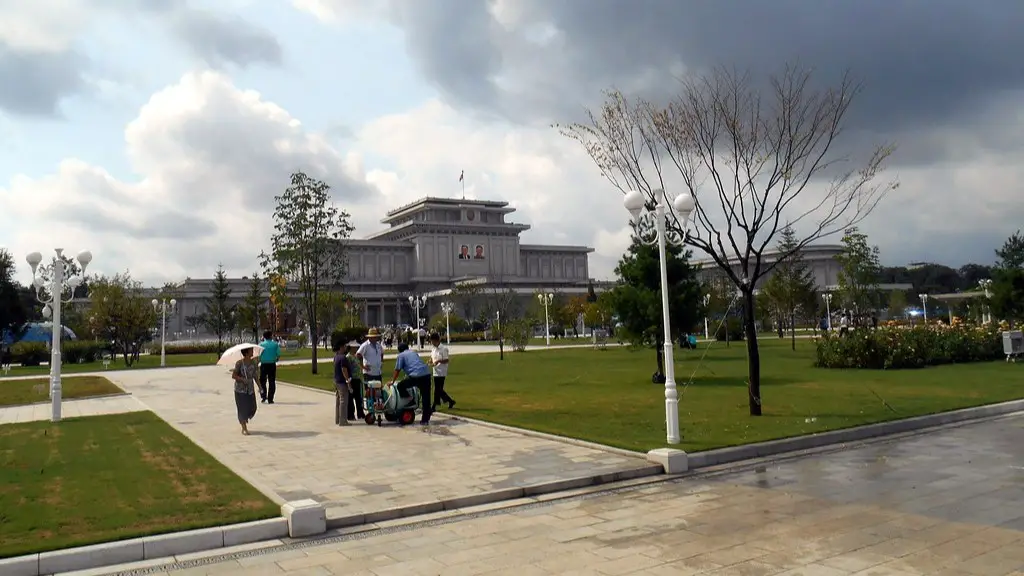1. Background of US. Vs North Korea
North Korea-America relations have been strained since the Korean War of 1950-53, when US troops fought alongside the South against the North. After the war ended in an armistice, the states never signed a peace treaty. This essentially means that the two nations have technically been in a state of war ever since. The decades since have been marred by nuclear threats and military provocations. The US has been the only power to have ever used a nuclear weapon and North Korea is actively attempting to develop its own nuclear weapons. On the other hand, the US has been a major economic and military power for decades.
2. Political Influence
North Korea is a closed society with a government that is among the world’s most totalitarian and repressive. It has a highly centralized system of government, which is headed by the Kim family. Kim Jong Un, the current leader, has tightened his grip on power since coming to power in 2011 and purged people who he viewed as threats, including his own family members. He has also done much to consolidate his control over the country’s all powerful National Defence Commission, the Standing Committee of the Politburo and the Central Military Commission.
The US, on the other hand, is the world’s foremost superpower. It is a stable democracy with a strong system of checks and balances. Its economic and military might have made it the primary arbiter of international disputes and an effective global leader. It has also used this power to promote human rights, democracy and economic development around the world.
3.Economic Factors
North Korea is among the poorest nations in the world. Its economy is heavily reliant on foreign aid and is plagued by chronic shortages of food and basic services. The economy is largely state-controlled and is dominated by a handful of powerful companies, which are usually run by the military or political elite. The situation has been made worse by the regime’s restrictive policies, which limit foreign investment and access to the country’s markets.
The US, on the other hand, has the world’s largest economy, with a GDP of around US$19.39 trillion and a per capita GDP of US$62,641. It is the world’s largest exporter of goods and services and has a vibrant private sector that is the envy of the world.
4. Military Might
North Korea has one of the largest standing armies in the world and has a collection of conventional weaponry, including artillery, tanks and planes. It is also believed to possess problematic chemical and biological weapons and is actively attempting to build its own nuclear arsenal. To make matters worse, the country is prone to brinkmanship and has a history of military provocations against its neighbors and the US.
The US, on the other hand, has the world’s most powerful military and is a nuclear powerhouse. Its conventional military capabilities are much more advanced than North Korea’s and its navy is the largest in the world. It also has the world’s most sophisticated intelligence network and the highest technological prowess.
5. Potential Consequences
Given North Korea’s military capabilities, a potential war with the US could be devastating for both sides. For North Korea, a full blown war could lead to the loss of millions of lives and devastation of infrastructure and resources. For the US, a potential conflict could be costly in terms of money and lives, not to mention its potentially destabilizing effect on the global economy.
6. Relationship with China
China is North Korea’s closest ally and economic partner. China has long been an economic lifeline for North Korea and provides the country with food, fuel and other necessary resources. China has also provided political cover for the North Korean regime and has consistently opposed UN sanctions against the country.
The US has a complicated relationship with China. On the one hand, it is an important economic partner and the two countries have extensive economic and cultural ties. On the other hand, tensions have been escalating in recent years due to China’s increasingly assertive foreign policy and its “One China” policy, which has become a major source of tension in the region.
7. Deterrence and Conflict Prevention
The US has used deterrence and conflict prevention to avoid an all out war with North Korea. This includes working closely with its allies to impose economic sanctions on North Korea and using diplomacy to establish channels of communication with the regime. The US has also used military exercises and the deployment of military assets in the region to demonstrate its commitment to defending its allies.
8. Diplomacy
The US has also pursued diplomatic avenues to resolve the crisis. The Trump administration has sought to use its diplomatic relations with China to pressure North Korea into scaling back its nuclear ambitions. The US has also engaged in diplomacy with North Korea directly and recently reestablished diplomatic relations with the state.
9. The Nuclear Dilemma
The US and North Korea are locked in a perilous nuclear stand off. North Korea has conducted a series of provocative nuclear tests and continues to build up its arsenal of nuclear warheads. The US has responded by leading multilateral efforts to impose crippling sanctions on North Korea and has also conducted its own military exercises in the region.
10. International Pressure
The international community, led by the US, has ratcheted up its pressure on North Korea in recent years, imposing a range of economic sanctions, freezing the country’s assets and restricting its ability to access international financial markets. Despite these measures, the North Korean regime has shown no signs of relenting, and continues to pursue its nuclear ambitions.
Conclusion
The US and North Korea are locked in a tense stand off and a war between the two nations could have devastating consequences for both sides. The US is using a combination of military, diplomatic and economic measures to pressure North Korea into giving up its nuclear weapons program. Ultimately, a diplomatic solution is the only way to resolve the crisis and prevent a disastrous conflict between the two nations.


